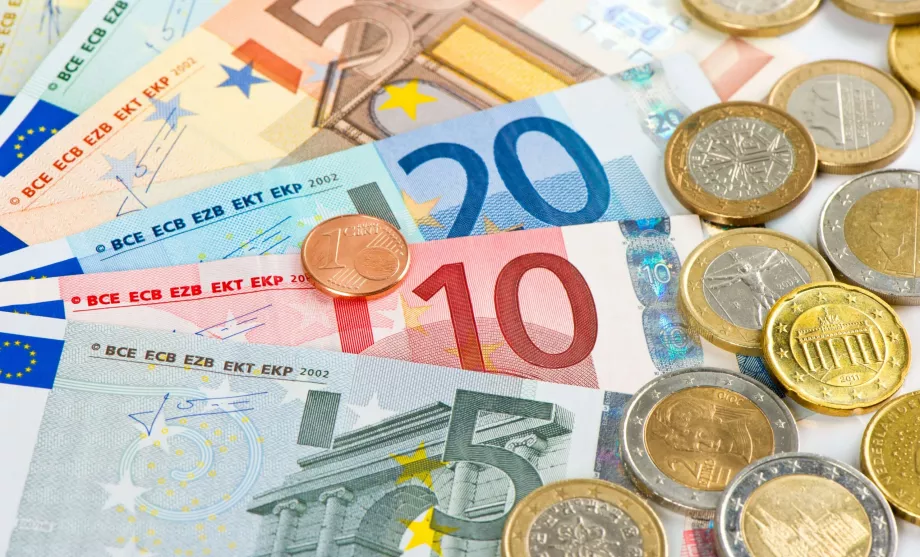Currency and prices in Greece

What currency do you pay with in Greece? How much do goods cost in a regular supermarket and how much in a restaurant? And how much does a week's stay cost? Find out in this chapter.
Prices of the cheapest hotels in Greece
Euro
In Greece, as in most other EU countries, you pay with the euro, which is worth 100 cents. Bank notes are worth 500, 200, 100, 50, 20, 10 and 5 euros, while coins are worth 1, 2, 5, 10, 20 and 50 euro cents and 1 and 2 euros.
Until 2001, payment was made in Greek drachma.
- International currency code: EUR (numeric code 978)
- Currency symbol: €
Currency exchange and card payment
Card payments are widespread in Greece, and you can often pay by card in places you wouldn't expect, such as roadside stalls selling local wine or olive oil or fruit.
Nevertheless, we recommend carrying at least some cash with you. We did come across a few stalls and shops outside the big cities where you couldn't pay with a card while travelling around Greece.
Sometimes you can't even pay with a card on public transport, which can be a problem especially on intercity buses if you are returning from a remote beach without being able to withdraw money.
ATMs are reasonably accessible even in smaller towns and accept all international cards. The Greek government has set a maximum fee for ATM withdrawals with foreign cards at 1,50 eur, so you shouldn't pay more at any ATM in Greece.
- Tip: the best beachfront accommodation in Greece
- Recommended: the cheapest car rental companies
You can find a currency exchange office on almost every corner in Greek resorts, or you can exchange money at a bank. However, since the Euro is the common European currency, it usually works out better to withdraw money from an ATM.
How much does what cost - prices in Greece
Greece is one of the average expensive destinations within Europe.
For example, goods in the supermarket are very cheap, but on the other hand restaurants or beach services are significantly more expensive than in Bulgaria, Albania or Cyprus.
However, compared to Croatia, Italy or Spain, Greece is cheaper.
Prices vary quite considerably depending on the destination - for example, accommodation prices on the most expensive islands of Santorini and Mykonos can be up to 4 times higher than elsewhere in Greece!
Accommodation and restaurants are also more expensive on Crete, Rhodes, Corfu, Kefalonia or Zakynthos, and then also on the smaller islands where everything has to be imported expensively and there is little competition for accommodation.
Conversely, the cheapest restaurants or accommodation will be outside the coastal areas inland, but perhaps also on the outskirts of major cities such as Athens or Thessaloniki.
Example prices in Greece
How much does basic food, tourist attractions or transport cost in Greece? Check out this price guide.
Hotels and accommodation
- 3* seaside hotel with breakfast in high season - from 120 eur
- Apartments further from the sea without meals - from 80 eur
- Campsites and hostels - from 40 eur
- Hotel out of season in town - from 55 eur
- Find hotel prices on booking.com
Restaurant meal prices
- Main meal in a regular taverna outside tourist resorts - from 9 eur for moussaka to 15 eur for fish
- Main meal in a tourist restaurant - from 12 eur for moussaka to 25 eur for fish
- Fast-food (gyros, souvlaki) at a stand on the beach - 8 eur to 10 eur
- Drinks in the restaurant - around 4 eur for lemonade, around 2 eur for water
- Capuccino or espresso - 2,50 eur
Attractions and sunbeds on the beach
- 2 sunbeds and an umbrella on the beach - 12 eur to 30 eur depending on location
- Water skiing or snowmobiling - 60 eur
- Parasailing - 60 eur
- Banana boat ride - 40 eur
- Rent a pedal boat for an hour - 40 eur
Grocery store prices
- 1.5 litres of water - 0,80 eur
- 0.5 litres of water - 0,60 eur (government regulated price compulsory in all shops)
- Lemonade 0.5 l - 1,30 eur
- A loaf of bread - 2 eur
- 1 l milk - 1,50 eur
- 1 kg of tomatoes - 1,50 eur
- 1 kg oranges - 1,10 eur
- 500 g cheese - 7 eur
- 1 kg chicken - 6 eur
- 1 kg of pork - 8 eur
Prices of cigarettes and alcohol
- 0.5 litres of local draught beer in the restaurant - 4 eur
- 0.5 litre of beer in a shop - 1,40 eur
- A bottle of wine in a shop - 6 eur
- 0.7 litre of Ouzo - 10 eur
- Metaxa - 15 to 20 eur
- Pack of cigarettes - 4,60 eur
Transport prices
- Taxi: boarding fee from 3,50 eur, 1 km from 1,50 eur,
- One-way local bus ticket from 2,50 eur
- 1 litre of petrol - on average 1,80 eur, always higher on the islands (approx. 1,90 eur)
- Car rental for the day - from 30 eur depending on the season of the rental
- Compare car rental prices in Greece
Tipping and haggling
Tipping is usually included in the price of the service, so it is usually impossible to refuse, but in tourist restaurants it is customary to at least round up the price.
Generally, however, tipping culture is not particularly required in Greece and is practically not expected at all in local tavernas, and no one will be offended if you don't leave a tip.
Bargaining is only common in local markets and occasionally with taxi services, where it's advisable to agree on a price in advance so you're not unpleasantly surprised at your destination. You can also reduce the price at so-called "beach vendors".
How to save money?
Generally, the closer to the high season, the higher the prices.
So if you want to explore rather than lie on the beach, head to Greece during spring, early June or September or October.
Shop for fruit, meat and souvenirs in the markets, where everything is often cheaper than in the shops. If you can, go to restaurants outside the tourist centres, you can save more than 3 eur on individual dishes.
For transport, taxis are good for shorter distances, if there are more of you and you can share the price. Renting a car also works out well on the islands, usually 30-40 eur per day.
If you're heading to the islands in high season, you can save significantly by purchasing a package from a travel agent versus planning your vacation individually!
- Last-minute holidays - Crete
- Last-minute holidays - Corfu
- Last-minute holidays - Rhodes
- Last-minute holidays - Zakynthos
- Last-minute holidays - Santorini
- Last-minute holidays - Kefalonia
- All offers for holidays to Greece
Daily budgets
To give you an idea, we have prepared three possible daily budgets:
The low budget traveller - eats in street food or cooks his own meals from food bought in the markets, so he will spend around 15 eur for food per day, he will spend around 30 eur per night/person for accommodation in the simplest types of establishments and he will pay 5 eur for transport by buses and taxi services to the nearest town 4 km away. So the lowest daily cost will be around 40 eur.
The traveller choosing the golden mean route is staying in a nice three star hotel and will pay around 55 eur per person per night , eating in mid-range restaurants where he will pay around 40 eur for lunch and dinner plus spend more on other snacks during the day 15 eur.
They will also rent a car, which costs about 15 eur per person (if travelling two) upwards for a full day's rental + petrol averaging around 10 eur per day. So all in all it comes to a total of 140 eur.
These examples are just a guide, it is always important to have spare money with you for unforeseen situations and to check prices according to the specific destination and dates.
The following table shows prices for a week's stay for 2 people. The cost is per day for 1 person.
| Accommodation | Food | Public transport | Car rental | Attractions | Total price | |
|---|---|---|---|---|---|---|
| Low-cost | 30 eur | 15 eur | 10 eur | 0 eur | 10 eur | 65 eur |
| Regular traveller | 55 eur | 55 eur | 0 eur | 25 eur | 40 eur | 175 eur |
Any questions left?
If you have any questions or comments about the article...


